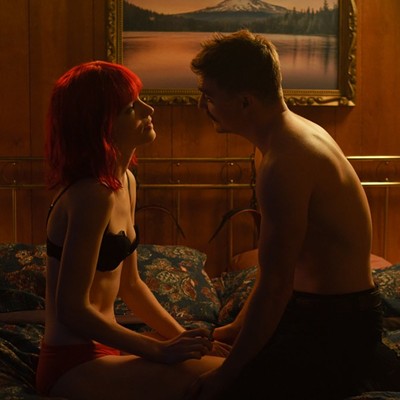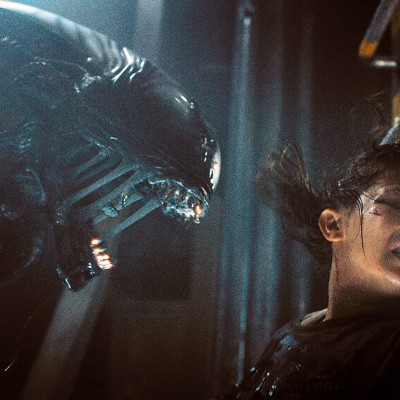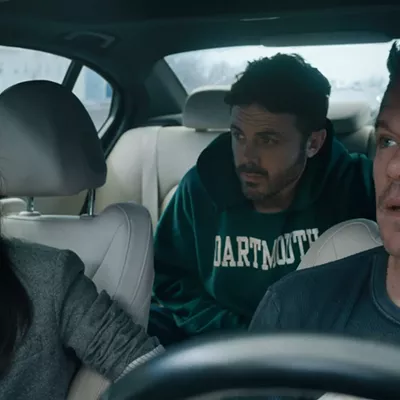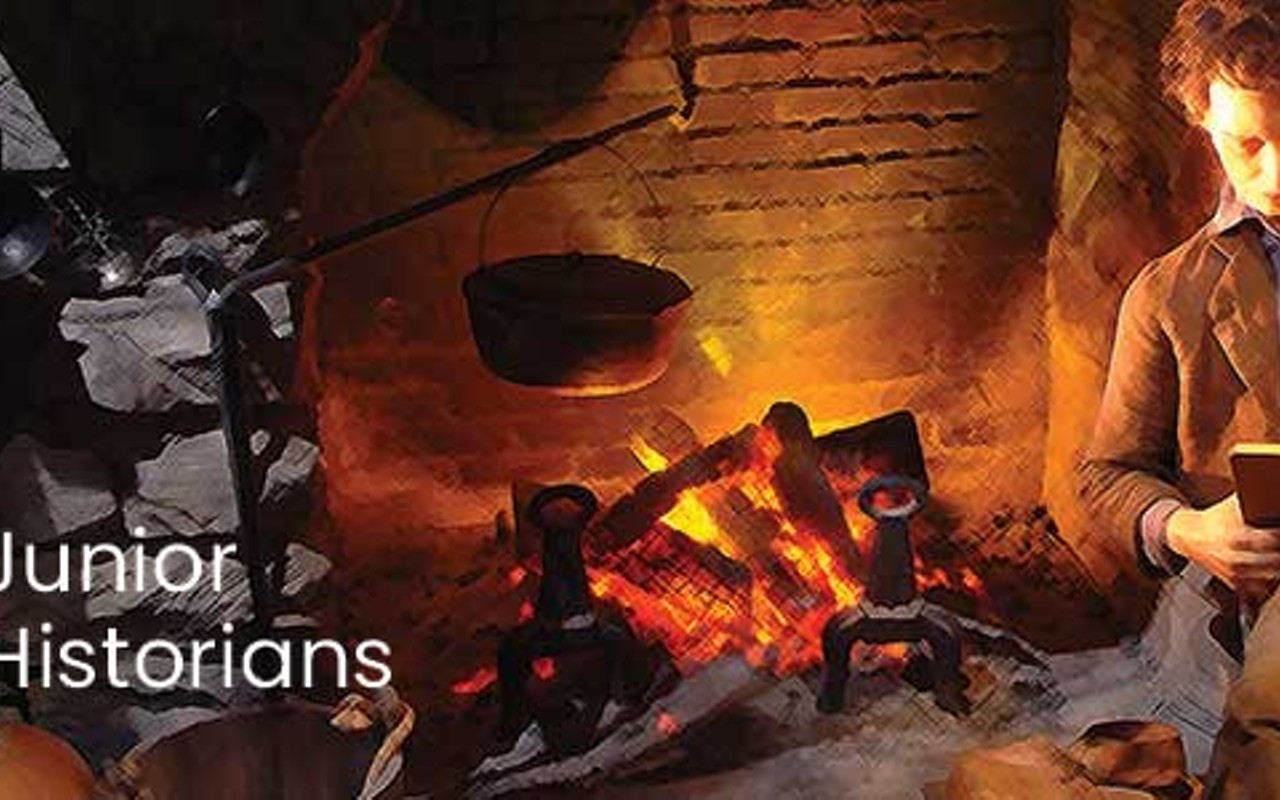Sincerity saves Angels
"Truth is stranger than fiction, but it is because Fiction is obliged to stick to possibilities; Truth isn't."
It would be wise to keep this quote from Mark Twain in mind while watching Jon Gunn's Ordinary Angels, a fact-based, feel-good movie that defies logic. That Ed Schmitt (Alan Ritchson) is questioning his faith is hardly a surprise. His wife died of Wegener's Disease, leaving him two young daughters to raise and now five years later, the youngest, Emily (Michelle Schmitt), is suffering from biliary artresia and needs a liver transplant. Without health insurance, he is drowning in debt and, no matter how many hours he works, is in danger of losing his home.
Sharon Stevens (Hilary Swank) is struggling with her own issues. Though she owns a successful hair salon, she refuses to deal with her alcoholism, no stranger to imbibing until she is blackout drunk. Having alienated her son, she is alone, though her friend and co-worker Rose (Tamala Jones) does her best to look out for her, taking her to AA meetings Stevens refuses to participate in.
However, during one of the meetings, Stevens overhears a piece of advice that hits home. To paraphrase, she's told to find a purpose that is bigger than she is, and she does so when she sees a news story on the Schmitts' plight and Emily's need. She raises over $3,000 in a "cut-a-thon" and is met with disbelief by Ed and his mother, Barbara (Nancy Travis), when she delivers this bounty. Invited in for dinner, Stevens soon realizes the family needs more than a large influx of cash.
Swank is one of our finest actors and she wisely knows how to approach a broad character like Stevens, modulating her performance in key moments. A lesser performer would give into the temptation to take a scene-stealing approach, but she knows this would undercut the credibility of the hard-to-believe events that take place. Ritchson proves to be more than a simple hunk who can convincingly snap legs or crack necks as he does on Amazon Prime's Reacher, giving a surprisingly subtle performance. Much is roiling about beneath his character's stoic appearance and in the moments he's required to show emotion, there's an unforced sincerity that proves effective.
While Stevens proved the catalyst for the life-altering events that occurred, the citizens of Louisville responded in a way that reminds us that great things can happen when we work towards a common, positive goal. After watching Angels, do a bit of research on Stevens and the events documented here. It'll do your heart good. In theaters.
Dolls fails to connect
I have no doubt that Ethan Coen's Drive-Away Dolls will have its passionate fans and that it will likely become a cult classic. It's purposely eccentric, broadly rendered, and if you were ever required to cite a film that dances to the beat of its own drum, this would be a prime example. Set in 1999, this adventure, the first in a proposed trilogy, centers on Jamie (Margaret Qualley) and Marian (Geraldine Viswanathan), two lesbians who come together through an unusual set of circumstances. The former has just broken up with her possessive police officer partner, Sukie (Beanie Feldstein), and is need of a change, so she decides to take a road trip to Tallahassee, Florida, to clear her mind. Not wanting to make the 15-hour drive from Philadelphia by herself, she asks Marian to come along, a decision made to alleviate the stultifying boredom that's pervaded her life.
However, what should have been a simple trip is complicated when they show up at a seedy car rental shop for a drive-away – a vehicle that needs to be delivered to a specific location – and are given the wrong auto. Unbeknownst to them, there are two items in the trunk of the car that should have been given to goons Flint and Arliss (C.J. Wilson and Joey Slotnick) to deliver, items of a highly sensitive nature that are worth a great deal of money to the person behind this job.
What ensues is a dual road-trip as Jamie and Marian ignore their agreed-upon timeline and careen about Georgia and other points south while the two amateurish hoods give chase. Eccentrics galore cross their paths and once the titular characters discover just what's in their rental, things take a radical turn. Coen purposely uses a tacky, B-movie aesthetic, sending a clear message just how we're supposed to take these shenanigans. This is just the most obvious of many choices the director makes to inform the viewer we are watching an elaborate Looney Toons feature, albeit one with graphic violence and gratuitous sex.
The script for Dolls strikes me as one in need of a rewrite or three and one can't help but wonder what Ethan's brother, Joel, may have brought to the project. Their past collaborations, even those that might be considered trifles, had a depth and polish to them this feature sorely lacks. Joel's first solo feature, The Tragedy of MacBeth, was as ambitious as Dolls is lackluster. Take that for whatever it's worth. In theaters.
McGregors lay themselves bare in Love
I think there's a great deal of catharsis and more than a bit of emotional healing taking place during Bleeding Love, a father-daughter story that resonates with its stars, Ewan and Clara McGregor. When the veteran actor left his wife and kids for fellow thespian Mary Elizabeth Winstead, Clara referred to her in the media as "a piece of trash," an initial reaction she eventually stated, "wasn't the most mature way to go about things." Father and daughter have since reconciled and all seems fine on the home front, the blended family now celebrating holidays together and welcoming the couple's newborn children into the fold.
Clara has stated the film "was inspired by my father and I finding each other in moments and how we lost each other in moments." This, as well as the fact the movie deals with substance abuse, which the actress has dealt with, adds a degree of raw realism and poignancy that gives this somewhat predictable story some much-needed gravitas.
It's obvious there's a sense of tension between the father and daughter of the piece from the start. Traveling through the southwest, a heavy silence pervades the cab of the beat-up pickup truck they're in. We eventually learn she has recently suffered a near fatal overdose, and he's come to take her home. What she doesn't realize is that he's taking her to a rehab clinic, a move he knows she'll fight.
There are few surprises along the way. The father and daughter tentatively deal with the pain they've caused one another and a temporary bond is formed that's torn asunder when she realizes she's headed to rehab and goes missing. Much like the criminally overlooked Ben Affleck feature The Way Back, the foundation of genuine pain, anger, desperation and ultimately forgiveness that exists between the two performers makes this more than a simple throwaway movie. To be sure, it is self-serving on multiple levels, but the McGregors' willingness to lay themselves bare isn't solely narcissistic. The problems each deal with are not sugar-coated, and the film is wise enough not to suggest that once the daughter completes rehab, all will be well. That her recovery and theirs will require a life-long commitment and that relapses are likely is never in doubt.
Director Emma Westenberg does a fine job creating a "you-are-there" aesthetic that perfectly complements the emotional goings-on. There is a sense throughout that we are eavesdropping on what the father and daughter are dealing with, which is the point. The McGregors are presenting their relationship as a cautionary tale, one they hope similarly troubled viewers of Love can glean some hope from. Available through Video-On-Demand.


















